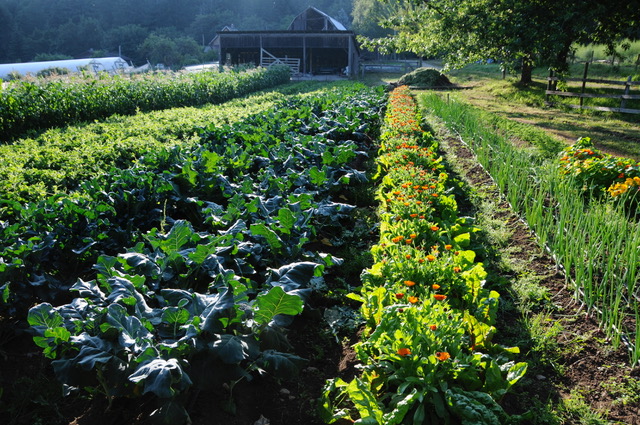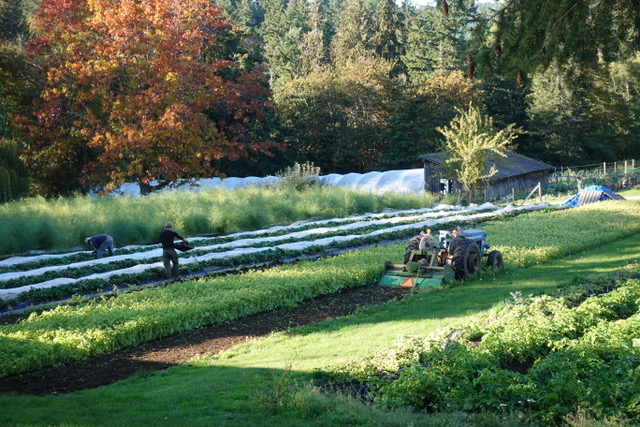
Dec 11, 2020
Thinking like an island: grower column
Every spring for the last 43 years I have followed the same routine.
I turn under green manure crops, spread compost, prepare fields and direct seed and transplant. The seeds and small plants that go into the ground are the product of months and sometimes years of propagation work, the compost made throughout the prior season, the complex crop rotation and field plans the result of a winter of careful thinking and consideration, the soils built and improved over decades. Before the first seed gets planted, many months and thousands of dollars have already been invested into a professional endeavor that requires decades to develop and perfect.
This past spring was different. I had to go through all the same motions as I always had, but this time for the first time. I am not alone, every farmer everywhere struggled with the same concerns.

The Saturday market was temporarily closed, the Tuesday market was in question, and the restaurants on the island where I live and beyond that we sell to were shuttered. I support every and any effort to stem the spread of this disease, but as the weeks progressed there was food to harvest and people who needed it. Would it not be safer, with strict protocols in place, to purchase food directly from local farms in an outdoor space, than food from inside a store that has traveled long distances and been handled by many anonymous hands?
Thankfully many communities around North America determined that farmers provide an essential service, and that farmer’s markets should remain open.
Most of my farming colleagues continued to put in the long hours to do the work we love and plant food for the community. Many of us were asking ourselves a simple question – how can we safely and most responsibly feed our community? Some farmers were providing food boxes on a subscription basis, others were selling to their immediate neighbors, we offered both home delivery and a “drive-thru” pick up option at our farm.
The response was overwhelming. People understood that the food distribution system can experience disruptions and those farmers who cater to their local regions are recognized as critical to the health and survival of their communities.
Humans have an uncanny ability to respond creatively to an emergency. There is historic precedent for this. Look at how people come together after an earthquake, flood, or hurricane. When everyday reality is suspended we do what is necessary to survive and to help others as well.
In 1989, the island of Cuba faced mass starvation, the result of having lost access to food and agricultural supplies from the former Soviet Union. Cuba responded by creating a world-class model of urban and rural agriculture based on low-input systems. But the Cubans did not green their agricultural system because it was the right thing to do, they did it because they had to.
None of us know for sure how long this crisis will last, but we do know we all have to eat, and now more than ever we all need to eat well.
It may be that the current pandemic has provided us with an opportunity to create a food system that truly reflects who we are, where we live, and the reality that we may no longer be able to rely on the industrial food system that still supplies the majority of our food. Where I live is an island, we are all now being asked to think like one.
The financial impacts of all of this will go on long after the disease has diminished. This year there may be more people who simply cannot afford to access fresh food. The responsibility for this, for making sure that everyone has a place at the table, belongs to all of us, not just the tiny percentage of our population we call farmers. This too can be an opportunity.

Each morning when I walked my fields observing, making lists, checking newly planted crops. These walks revealed new leaves unfurling, soil lifting and cracking exposing green pea knuckles, flower jackets slipping off freshly formed fuzzy apple babies, small fleeting gifts like drops of dew on taught squeaky cabbages reflecting the light of the world. But my heart and mind were also consumed by the suffering I see in the broader world around me, by the internal collision between our human predicament and the audible sigh of relief I can hear from our Mother Earth as the world pauses and the constant assault, the extraction and pollution, the grabbing and grasping, have been forced to just stop.
We may feel paralyzed when faced with the enormity of our modern dilemma, but we have enormous power in and around the places where we live. This is our time to come back home, to support all those who are re-imagining and replanting our world – one seed, one farm, one meal, one individual at a time.






